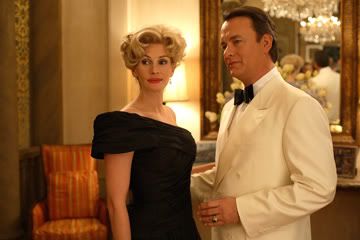Charlie Wilson's War (2007)


This sure has been a great year for movies. But what "Charlie Wilson's War" has over the other movies this Oscar season is that it's appealing and pure entertainment for the adult crowd. This is the type of movie you go to see after a dinner out, enjoy while you're watching it, and then pretty much forget about it after you go see it. Not to say that the movie isn't good, though, because it certainly is; it's just not great. It's a perfectly breezy, fast-paced political satire that's more of a hoot than one would expect and hits all the right marks without diving into anything too deep.
Directed by Mike Nichols with a screenplay by Aaron Sorkin, this is the true story of Texas congressman Charlie Wilson (Tom Hanks) in the 1980s who single-handedly helped to end the Cold War. He's a good ol' boy with a personal life that isn't perfect, but everybody loves him, which is why he keeps getting reelected again and again. He has an office full of voluptuous young women (who are also very smart) at his every call, and he's never without a drink in his hand. It's as if Charlie Wilson stumbled upon the career move of his life on accident when he initially decides to double the budget for Afghanistan's defense against the Soviets.
When we first meet Charlie, he's sitting in a hot tub in Las Vegas surrounded by a bunch of naked Playboy women and cocaine usage. While sitting there, he witnesses some Dan Rather footage on the adjacent TV about the situation in Afghanistan. After his first sudden reaction, the wheels really start turning when Joanne Herring (Julia Roberts), a rich Houston socialite, gives him a call and opens his eyes to what's really happening. He has always taken an interest in her, and they casually sleep around together. While he's soaking in her bath tub, she tells him about the Afghans needing weapons to shoot down the Soviet helicopters, and since Charlie is on the Defense Appropriations Subcommittee, he would ideally be the man to help. The problem is that they need to get the weapons from somewhere else. The solution is to use Soviet weapons left in the hands of the Israelis and transfer them through Pakistan to the Afghans.
To aid him in his covert arms plan, he finds the only helpful person in the CIA: Gust Avrakotos (Philip Seymour Hoffman). This pot-bellied, hard-hitting guy full of resentment is just the man for the job. After a planned visit with the president of Pakistan, General Zia, meetings with a few other men, and the help of a friendly belly dancer, Charlie Wilson pulls off the deal. He eventually raises the funding for Afghanistan from a useless $5 million to a whopping $1 billion, all done in secret. The whole ordeal is done so frivolously, it makes you wonder if politics really can be this fun. It's also amazing how so much information actually fits into a 97-minute movie that's basically comprised of one semi-comic scene after another. Talk about an easy history lesson.
With three excellent performances under his belt, it's going to be tough to choose which one to recognize Philip Seymour Hoffman for this year. He steals every scene he's in, whether he's hitting on Joanne or exploding in rage and breaking a window. This isn't Tom Hanks' best performance, but it's still pretty good, as he gets a chance to be somebody we've never seen him as before. He has a good time with the role, being sexier, sleazier, and more wry, creating a person we immediately like. Julia Roberts isn't even in the movie very much, which is actually a shame because the relationship between her and Charlie could've been fleshed-out a bit more. Although somewhat of a letdown, she's still enjoyable to watch. And then there's "Enchanted"'s Amy Adams, who's as charming as ever, playing Charlie Wilson's assistant. She keeps him in line, keeping track of his schedule, and admiring him all the way.
"Charlie Wilson's War" has an underlying wit of irony about it in that we wonder if Charlie Wilson's commitment to his cause was truly intentional. The audience also realizes that although all of what Charlie did looked good at the time, it opened the bag for all that is happening now with the war in Iraq. The "freedom fighters" in Afghanistan became the Taliban, using those same weapons against us, and things only escalated from there. There's a message on the fact that it didn't end where the movie ends. Charlie had a right for what he did, that's for sure, but he wanted plans for reconstruction that Congress didn't follow. As he quotes at the end, "We fucked up the end game."





No comments:
Post a Comment